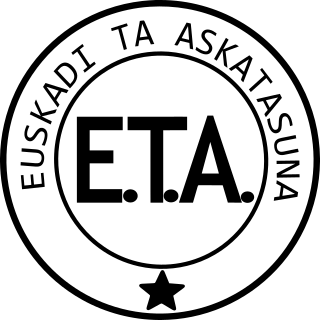
ETA, an acronym for Euskadi Ta Askatasuna, was an armed Basque nationalist and far-left separatist organization in the Basque Country between 1959 and 2018, with its goal being independence for the region. The group was founded in 1959 during the era of Francoist Spain, and later evolved from a pacifist group promoting traditional Basque culture to a violent paramilitary group. It engaged in a campaign of bombings, assassinations, and kidnappings throughout Spain and especially the Southern Basque Country against the regime, which was highly centralised and hostile to the expression of non-Castilian minority identities. ETA was the main group within the Basque National Liberation Movement and was the most important Basque participant in the Basque conflict.

The 2004 Madrid train bombings were a series of coordinated, nearly simultaneous bombings against the Cercanías commuter train system of Madrid, Spain, on the morning of 11 March 2004—three days before Spain's general elections. The explosions killed 200 people and injured around 2,500. The bombings constituted the deadliest terrorist attack carried out in the history of Spain and the deadliest in Europe since 1988. The attacks were carried out by individuals who opposed Spanish involvement in the 2003 US-led invasion of Iraq.

Gara is a bilingual (Basque/Spanish) leftwing Basque Nationalist newspaper published in the city of Donostia-San Sebastián in the Basque Autonomous Community. The newspaper's target market comprises the area of the Basque Country, but its circulation is largely constrained to the Southern Basque territory (Spain), since Spanish is mainly used rather than French.
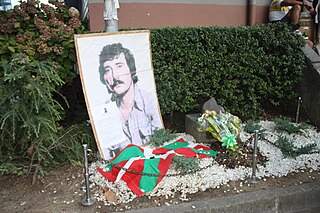
GAL were death squads illegally established by officials of the Spanish government during the Basque conflict to fight against ETA, the principal Basque separatist militant group. They were active from 1983 to 1987 under Spanish Socialist Workers' Party (PSOE)-led governments.
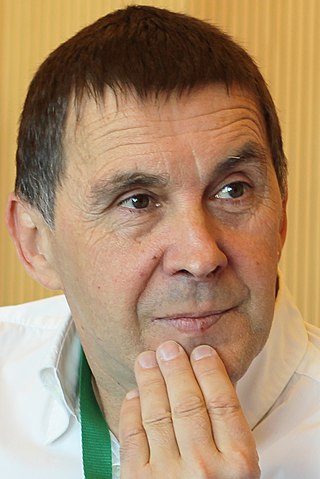
Arnaldo Otegi Mondragón is a politician from the Basque Country who has been the General Secretary of Basque nationalist party EH Bildu since 2017. He was member of the Basque Parliament for both Herri Batasuna and Euskal Herritarrok. He was a convicted member of the ETA, a banned armed separatist group organization, in his early years. He was one of the key negotiators during the unsuccessful peace talks in Loiola and Geneva, in 2006.
Berria is the only daily newspaper published wholly in the Basque language and which can be read in the entirety of the Basque country. It was created after the closure of the previous Basque language newspaper, Egunkaria, by the Spanish government, after being accused of having ties with ETA.

Standard Basque is a standardised version of the Basque language, developed by the Basque Language Academy in the late 1960s, which nowadays is the most widely and commonly spoken Basque-language version throughout the Basque Country. Heavily based on the literary tradition of the central areas, it is the version of the language that is commonly used in education at all levels, from elementary school to university, on television and radio, and in the vast majority of all written production in Basque.
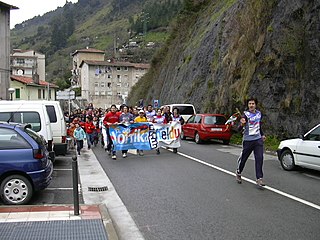
Korrika is a biennial event in the Basque Country that creates awareness of AEK's adult Basque language curriculum and Basque language, and is also a fund raiser; AEK is an adult education organisation for the teaching of Basque language. It is one of the largest demonstrations gathering support for a language in the world, and the longest relay race worldwide, with 2,700 kilometres in 2024, running day and night without interruption for 11 days. The Korrika is celebrated beyond its fundraising goal, encouraging, supporting and spreading the Basque language itself.
Juan del Olmo is a Spanish judge in the 2004 Madrid train bombings case. In 2003, he ordered that the Euskaldunon Egunkaria newspaper be closed on grounds of accusations driven by a "narrow and erroneous view according to which everything that has to do with the Basque language and with culture in that language is promoted and/or controlled by ETA", as determined seven years after by a sentence of the Criminal Court of the Audiencia Nacional of Spain.
Luis C. Nuñez Astrain is a linguist and sociologist, and was editor of the newspaper Egin.
Egin was a Basque newspaper written in Spanish language and Basque language. Founded in 1977 the paper was in circulation until 1998 when it was closed down by the Spanish government.

Argia is a weekly news magazine published in the Basque language, the oldest one still in circulation. Their main office is in Lasarte-Oria, Basque Country. Its name was Zeruko Argia from 1919 to 1921 and from 1963 to 1980, and Argia from 1921 to 1936 and from 1980 to present. It had to cease its activity because of the Spanish Civil War in 1936, and it could not be published again until 1963, when Francoist Spain lifted its ban on Basque-language publications.
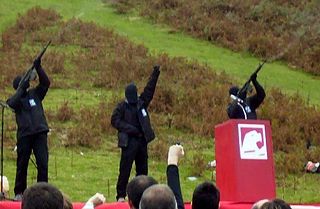
The Basque conflict, also known as the Spain–ETA conflict, was an armed and political conflict from 1959 to 2011 between Spain and the Basque National Liberation Movement, a group of social and political Basque organizations which sought independence from Spain and France. The movement was built around the separatist organization ETA, which had launched a campaign of attacks against Spanish administrations since 1959. ETA had been proscribed as a terrorist organization by the Spanish, British, French and American authorities at different moments. The conflict took place mostly on Spanish soil, although to a smaller degree it was also present in France, which was primarily used as a safe haven by ETA members. It was the longest running violent conflict in modern Western Europe. It has been sometimes referred to as "Europe's longest war".
Basque National Liberation Movement prisoners are all those people who have been imprisoned, placed on remand, or otherwise kept in custody due to their illegal activity in support of the Basque National Liberation Movement.
Censorship in Spain involves the suppression of speech or public communication and raises issues of freedom of speech.
Joan Mari Torrealdai Nabea was a Basque writer, journalist and sociologist. He was a member of Euskaltzaindia. He was born in Forua, Biscay, Basque Autonomous Community, Spain.

The Altsasu incident is a judicial case against eight young people from Altsasu, a small town in Navarre, Spain, for their involvement in a fight taking place on 15 October 2016 at a bar in which two off-duty Civil Guard officers stationed in the town and their girlfriends sustained injuries. One of the officers was knocked down, with the other victims reported to have suffered "psychological trauma". The lawsuit was initially conducted by the judge of the Spanish special court Audiencia Nacional Carmen Lamela. As of March 2018, Concepción Espejel was appointed as magistrate ahead of the trial held in late April.

Fernando Grande-Marlaska Gómez is a Spanish judge and politician who has served as minister of the Interior since June 2018. An independent politician close to the Spanish Socialist Workers' Party, he has been Member of the Congress of Deputies from 2019 to 2020, and briefly from August to December 2023, representing Cádiz.
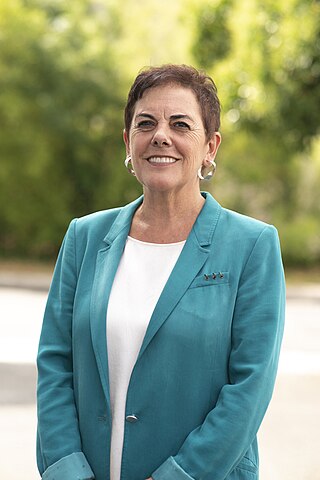
Mertxe Aizpurua Arzallus is a Basque journalist and politician who currently serves as Member of the Congress of Deputies of Spain.

Maria Angeles Beitialarrangoitia Lizarralde is a Basque journalist and politician. She was previously a member of the Congress of Deputies of Spain and Basque Parliament, and mayor of Hernani.














